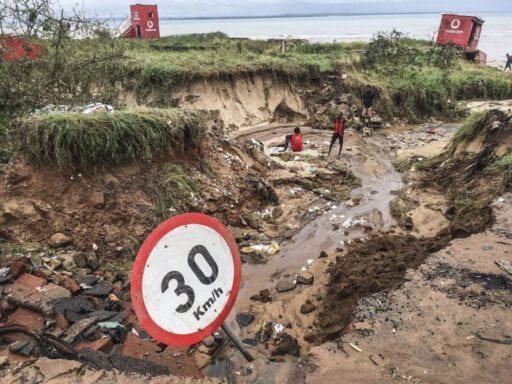Rescuers struggled to evacuate people living in the flooded city of Pemba.
Cyclone Kenneth has left five dead in Mozambique as of Sunday as rescuers struggled through floods to reach stranded people and move them to safety. The flooding is worst in the northern port city of Pemba, where 4,500 people have left their homes for refugee shelters.
Throughout the country, more than 160,000 people have been displaced by the cyclone, 30,000 houses have been destroyed, and 24,000 people are in need of shelter, according to the World Food Program.
Happening now:
Water levels in Pemba, #Mozambique, continue to rise in a worrying way. Houses started to collapse in Natite neighbourhood, according to the rescue team operating there.
We are unfortunately expecting devastating floods as consequence of #CycloneKenneth pic.twitter.com/FKOdRf9wkG
— OCHA Southern & Eastern Africa (@UNOCHA_ROSEA) April 28, 2019
On Ibo, an island in the same Cabo Delgado Province as Pemba, a hotel owner told CNN, “Ninety-five percent of the homes on Ibo have been destroyed — not only roofs blowing off, but down to the ground.”
Nicholas Finney of Save the Children told the Associated Press the type of “total devastation” seen on Ibo stretches for nearly 40 miles along the coastal Cabo Delgado region.
Finney also said the damage has made it difficult to bring in aid: “Helicopters cannot fly, a number of flights were canceled, so humanitarian workers cannot arrive and additional cargo cannot arrive by air.”
Aid workers report “scenes of vast destruction” in areas like Mucojo in province of Cabo Delgado following #CycloneKenneth Five deaths reported so far; main city of Pemba largely spared. Images courtesy of @UNOCHA_ROSEA which has deployed for the response #GP2019Geneva pic.twitter.com/e8ZfXUigg0
— UNISDR (@unisdr) April 27, 2019
Although the storm has mostly passed through the area, residents fear the worst may still be to come. Massive deadly floods followed the last cyclone to hit Mozambique as riverbanks broke, and officials worry similar flooding could affect Pemba and the surrounding region.
The United Nations Office for the Coordination of Human Affairs (OCHA) reported some Pemba residents also fear post-cyclone landslides.
We just visited Mahate neighbourhood in Pemba, where landslides are feared. The population is still in the zone, with some houses too close to this large crack crossing the community. @ICalamidades is mobilizing a team to evacuate the area.
Photos: OCHA/@savianoabreu pic.twitter.com/c3ISVDl6H7
— OCHA Southern & Eastern Africa (@UNOCHA_ROSEA) April 28, 2019
Cyclone Kenneth is the second cyclone to batter Mozambique
Cyclone Kenneth, which made landfall Thursday with the force of a Category 4 hurricane, was the second cyclone to hit Mozambique in five weeks. The first, Cyclone Idai, devastated parts of Mozambique, Malawi, and Zimbabwe in March leaving more than 1,000 people dead.
The landfall of Kenneth marks the first time in recorded history two cyclones have hit Mozambique in one season, Al Jazeera reports. As Vox’s Brian Resnick reported, the intensity and proximity of the two storms could point to a changing climate:
It’s hard to know if the double whammy of storms is connected to climate change. But here’s what we do know: Climate change is allowing storms to hold more moisture. “There is absolutely no doubt that when there is a tropical cyclone like this, then because of climate change the rainfall intensities are higher,” Friederike Otto, a climate scientist at University of Oxford, told the BBC.
Sea level rise means that storm surges are also worse, and there’s some emerging evidence that climate change makes the rapid intensification of storms more likely (Kenneth increased from Category 1 intensity to Category 4 in one day). It’s also possibly making storms more likely to slow down, dumping more rain. While it will take some time for scientists to figure out how much of Kenneth’s intensity to attribute to climate change, what’s already clear is that all of these factors are present.
Although Kenneth and Idai made landfall in different parts of the country, the two storms are putting strain on recovery resources.
“Existing relief resources for Idai are not sufficient as things stand,” said Marc Nosbach, the Mozambique country director for aid organization CARE, said in a statement when Cyclone Kenneth first hit. “Due to the funding situation our teams are stretched beyond their capacity and responding to another disaster in Mozambique without more resources will be very difficult, if not impossible.”
The UN said 1.8 million people are in need of aid due to the devastation caused by Idai, and it believes another 168,000 people will need aid due to Kenneth.
Author: Gabriela Resto-Montero
Read More



